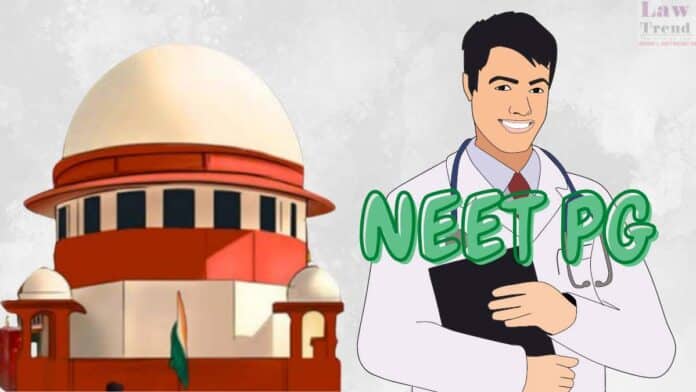In a significant ruling aimed at curbing rampant malpractice in postgraduate medical admissions, the Supreme Court has issued a comprehensive set of directives to reform the NEET-PG counselling process. The ruling, delivered by a bench comprising Justice JB Pardiwala and Justice R Mahadevan, takes direct aim at the practice of “seat-blocking” — a systemic abuse that has long plagued the credibility of NEET-PG admissions.
The judgment comes in response to a petition originally filed by the State of Uttar Pradesh and the Director General of Medical Education & Training, challenging a 2018 Allahabad High Court order that had penalized authorities for irregularities in that year’s counselling process.
What Is Seat Blocking?
Seat-blocking refers to the manipulation of medical counselling rounds where candidates accept seats temporarily, only to vacate them after securing more desirable placements in later rounds. This strategic abandonment creates artificial scarcity, misleads other aspirants, and compromises the principle of merit-based selection. The Supreme Court described this practice as a symptom of deeper structural issues including poor coordination, lack of transparency, and fragmented oversight.
“Seat blocking is not merely an isolated wrongdoing – it reflects deeper systemic flaws… Achieving a truly fair and efficient system will require more than policy tweaks,” noted Justice Pardiwala in the judgment.
Key Directives from the Supreme Court
To tackle these issues comprehensively, the Court has laid down ten key directives:
- National Counselling Calendar: Introduce a unified counselling schedule to synchronize All India Quota (AIQ) and State rounds.
- Pre-Counselling Fee Disclosure: Mandate all private and deemed universities to publicly declare tuition, hostel, and other charges before counselling begins.
- Centralized Fee Regulation: Establish a uniform fee structure overseen by the National Medical Commission (NMC).
- Upgrade Window Post-Round 2: Allow already admitted candidates to move to better seats without reopening the process to new entrants.
- Transparency in Exam Results: Publish raw scores, answer keys, and normalization methods to ensure fairness in multi-shift exams.
- Penalties for Seat Blocking: Enforce strict consequences, including security deposit forfeiture, disqualification from future NEET-PG attempts, and blacklisting of involved colleges.
- Aadhaar-Based Seat Tracking: Use Aadhaar for real-time seat tracking to eliminate duplicate or false seat holdings.
- Accountability for Authorities: Allow contempt or disciplinary action against state officials and institutional heads who violate rules.
- Uniform Counselling Code: Standardize procedures across states for eligibility, withdrawals, mop-up rounds, and grievance redressal.
- Third-Party Oversight: Appoint an independent body under the NMC to audit and ensure compliance annually.
Background of the Case
The Supreme Court’s directives stem from litigation over grievances raised by NEET-PG aspirants from the 2017-2018 academic year. The Allahabad High Court had found that less meritorious candidates were allowed to participate in mop-up rounds despite already being allotted seats, thereby disadvantaging higher-ranked aspirants.
The High Court awarded ₹10 lakh each as compensation to the petitioners and ordered structural reforms. However, the Supreme Court stayed the order in 2018 and has now modified the compensation to ₹1 lakh per petitioner, citing subsequent policy improvements.
The Court acknowledged reforms introduced post-2021 in the Nihila P.P. v. Medical Counselling Committee case, where a four-round counselling scheme was adopted for AIQ seats. However, the bench stressed that these measures must now be effectively enforced through a combination of centralized regulation and transparent practices.




